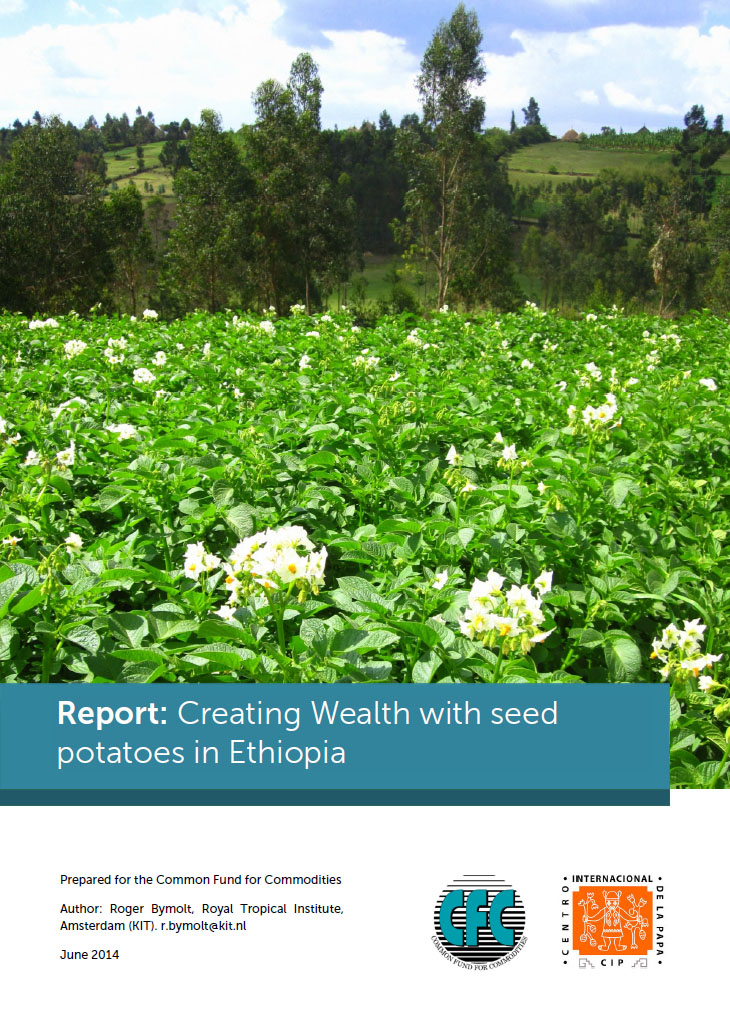(Nairobi, Kenya) Today, the Common Fund for Commodities (CFC) released evaluation reports on a CFC-funded and The International Potato Center (CIP) implemented project entitled ‘Wealth creation through integrated development of potato production in the highlands of Ethiopia’.
Key highlights from the project outlined in the report include:
- The project has brought new potato related knowledge and technologies, helped to organise farmers, and has significantly improved food security and household incomes.
- The project was well targeted and well implemented and applied a strategy which, rather than focusing on one or two production issues, took a systematic approach to transforming the seed and ware potato value chains.
- Project trainings have successfully built farmer capacity and professionalized seed production. This success should be built upon, since a large demand for improved seed throughout Ethiopia remains.
- The capabilities of farmer cooperatives to implement good agricultural practices has been adequately developed in a short period of time.
- The Diffused Light Storage approach for seed potato has been successful.
Please visit the following links to view the brief, executive summary and the full report.
The project began in 2008 to address the constraints faced by potato producers in Ethiopia and improve the wealth and livelihoods of potato producers. This new publication demonstrates how the project has contributed to a wide range of positive livelihood changes for potato farmers in the highlands of Ethiopia.
The project consisted of three implementing partners CIP, Ethiopian Institute of Agricultural Research (EIAR) and Holetta Research Centre that undertook implementation of the project in West Shewa, South West Shew, Guragie and Tigray zones, with three main objectives:
- Increase the availability of high quality potato seed at affordable prices;
- Improve farmer knowledge of crop husbandry and access to high quality seed, leading to improved yields and increased income and food security;
- Improve market linkages and communication between potato value chain stakeholders, leading to increased income
On behalf of the CFC, the Royal Tropical Institute (KIT) in Amsterdam, carried out a rapid independent evaluation of the project in April 2014 to measure change and document lessons from the intervention. A mixed methods research design was implemented in three woredas (districts) – Gumer, Geta and Wonchi. This included 190 quantitative surveys, focus group discussions at four locations based on the PADev methodology, interviews with key informants, and a review of available project literature.
Steffen Schulz, CIP Ethiopia Country Representative says that “the results of this project have made a difference in the lives of small holder farmers in Ethiopia and we hope that other initiatives can benefit from these positive examples that we are eager to share.”
The evaluation indicates that the project was highly relevant to highland farmers and is evidence that improvements in the potato production system can be a pathway out of poverty in Sub Saharan Africa, including Ethiopia. The project also demonstrates that potato is an excellent smallholder farmer crop, suited to the highlands, with a short cropping cycle, potential for large yield per hectare, and serves as both a cash and food security crop.
The potato sub-sector in Ethiopia is relatively undeveloped and is faced with low productivity. Constraints include a shortage of good quality seed tubers, a lack of adaptable and disease resistant varieties, sub-optimal production practices, a lack of storage facilities and inefficient marketing systems. The project was effective in alleviating these constraints in the project areas. Furthermore, the project was found to be well targeted to areas where potato production was either happening already on a limited scale, or had excellent potential through good climatic conditions.
In 2014 CIP named “Seed Potato for Africa” as one of six programs that it will focus on for the next 10 years as a way of improving food security and nutrition of smallholder farmers and the communities where they live.
The reports were prepared for the Common Fund for Commodities; Author: Roger Bymolt, Royal Tropical Institute, Amsterdam (KIT). r.bymolt@kit.nl
Further information: about the outcomes and challenges of the project can be found in the project document. For interviews, photographs or more comprehensive information about the project please contact Sara Quinn, Communications Specialist at CIP: s.quinn@cgiar.org
The International Potato Center (CIP) is a research-for-development organization with a focus on potato, sweetpotato, and Andean roots and tubers. CIP is dedicated to delivering sustainable science-based solutions to the pressing world issues of hunger, poverty, gender equity, climate change and the preservation of our Earth’s fragile biodiversity and natural resources. CIP is a member of CGIAR, a global agriculture research partnership for a food-secure future. www.cipotato.org
The Common Fund for Commodities is a Development Finance Institution created under the auspices of the United Nations to promote development through international cooperation between producers and consumers of commodities. The CFC pays particular attention to problems which developing countries experience due to their dependence on primary commodities. CFC finances practical measures which focus on mitigation of excessive price volatility, securing equitable benefits from production and trade of commodities, improving the functioning of the global commodity markets, as well as on any other development issues in commodity dependent developing countries. The Fund works with entire commodity value chains to unlock the full development potential of the commodity sector. http://www.common-fund.org
CFC Project Manager: Nicolaus Cromme (nicolaus.cromme@common-fund.org)

